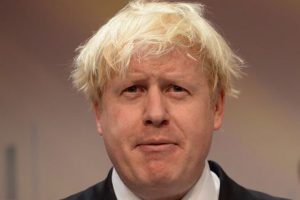Seem familiar? No, it’s not a strange photo of Donald Trump. It’s a picture of Boris Johnson, one of the main leaders of Brexit. Johnson shocked the British political world by announcing that he would not seek the post of Prime Minister. His announcement is the latest moment of upheaval that is measured almost in quarter-hour increments. You can’t keep up.
I have not written anything here about Brexit lately for that very reason. I can’t keep up, the news changes or, more accurately, appears to change every few minutes. We have the same dynamic on our side of the Atlantic is this crazy presidential election year. The thing you write about has changed a half-dozen times since hitting the button with “send” or “post” or “add” or a hundred other synonyms for “done” in the digital world.
Instead of trying to stay in pace with it, I’ve decided to turn my problem into a solution. Forget trying to keep up. Focus instead on offering perspective. That’s taking the disadvantage of millisecond time lapses and fashioning an advantage of a firmer grip.
Let’s look at what we know so far from Brexit.
First, polls mean little. Lots of polls showed the “Remain” side of Brexit with superior numbers, some more, some less. People are too hard to pin down right now, they change their minds too quickly. In addition, the polls are increasingly amplifiers for a particular side of the argument–the Remains were dominated visually by the “smart” people, the “cool” people, the “hip-and-with-it” people. When a poll result has one side overly tilted with such image-heavy expressions, it’s tempting to assume that their numbers are much larger than they actually are.
Second, the world hasn’t ended. The financial markets went wild in the immediate aftermath of Brexit. After a short passage of time, however, they settled down. Improvements and gain-backs occurred. Predictions of calamity didn’t prove true.
Third, while the effects aren’t calamitous as some feared, they certainly are jumbled and hard to control. As I wrote in the opening paragraph of this post, from out of nowhere Boris Johnson veered this way when everyone expected him to veer that way. It reminds me of an electrical line snapped off, popping and jumping with pulsating voltage. You can’t tell where it flops and sizzles next. We haven’t seen the last of unexpected turns as time moves forward from the fixed day of the Brexit vote.
Fourth, one of the most complex and fascinating threads of this story will be unity and the challenge of coming together. I’m not referring to anything fanciful or idealistic. I’m referring to the rock-hard issue of sub-groups that are suspicious toward each other having to overcome or set aside friction and find common cause. This common cause will unite them for a while. Whether they reach their goal or at least feel that the effort has been satisfactory and rewarding will tell how long the unity endures. The Johnsonites, the followers of Theresa May or Michael Gove or any of a score of other key players will be circling each other, trying out strategies, throwing away what doesn’t work, pressing hard on those that do seem to work. It’s part of any moment when sub-groups struggle to form larger coalitions to protect and to pursue self-interest.
Fifth, the next moment of great importance will be an event of terrorism in Britain. A city in England will be the likely location. This event will mix with the circling, forming, and re-forming that I just mentioned. It will have a massive impact on that process and interaction. Both the Leaves and Remains will react harshly to the terrorism event.
I end my post with a call to resurrect a word long out of favor. Anglo-American, an earlier form of what came to be known as the “Special Relationship.” Back in the previous couple of centuries, Anglo-American described a field of study, a set of issues, a particular part of the world and the habits, customs, techniques, and attitudes found there. I suggest to you that with Brexit as only the most recent of a thousand examples of the interplay between Britain and the United States (see Sherlock Holmes and Harry Potter), it’s worth the while to view the “Anglo-American” dynamic at work in the 21st century. My suggestion shouldn’t be viewed as any statement of superiority–it’s absolutely not. I’m only recommending that we can sharpen our insights through the rediscovery of something fallen into disrepair.
Thanks for reading.








